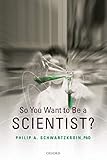So you want to be a scientist? / Philip A. Schwartzkroin.
Material type: TextPublication details: New York : Oxford University Press, 2009.Description: xv, 192 p. ; 24 cmISBN:
TextPublication details: New York : Oxford University Press, 2009.Description: xv, 192 p. ; 24 cmISBN: - 9780195333541
- 0195333543
- 502.3 22
| Item type | Current library | Call number | Copy number | Status | Date due | Barcode | |
|---|---|---|---|---|---|---|---|
 Books
Books
|
Main library General Stacks | 502.3 / SC.S 2009 (Browse shelf(Opens below)) | 1 | Available | 011146 |
Browsing Main library shelves, Shelving location: General Stacks Close shelf browser (Hides shelf browser)
| No cover image available No cover image available | No cover image available No cover image available |

|

|

|

|

|
||
| 500.82 SH. A 2004 أنثوية العلم | 501 / PO. U 2003 أسطورة الإطار | 501.51 / KH.M 1957 Mathematical foundations of information theory / | 502.3 / SC.S 2009 So you want to be a scientist? / | 502.82 / AY. S 2010 Sample preparation handbook for tranmission electron microscopy. | 503 / DA.D 2010 A dictionary of science / | 503 / PA.M 1998 McGraw-Hill concise encyclopedia of science & technology / |
Includes index.
Getting started -- Career choices and laboratory nitty-gritty -- How to think like a scientist -- How to write a scientific paper -- Giving presentations and talks -- How to compose/submit grant applications -- The politics of science -- Ethical conduct of research -- Scientific research as a creative enterprise -- The role of the scientist in society -- Personal challenges -- Rewards and riches.
What does it take to be a scientist? Equally important, what does it take to be happy as a scientist? Drawing on thirty years of experience, Philip Schwartzkroin offers the budding scientist an invaluable glimpse into the day-to-day life of the researcher, filling a huge hole in the education of most would-be scientists--whether undergraduates or high school seniors. As Schwartzkroin points out, many of the most important things researchers learn as they hone their craft are not written down anywhere. And many of these insights come as a surprise to the naive and well-meaning student who somehow believes that "doing research" is an occupation that is substantially different from doing a job in "the real world." This book looks at the "job" of science. Starting with suggestions about how to decide whether you'd want to pursue such a career (and if so, how to get started),
the book works through some of the obvious topics relevant to a research profession--how to write a paper, give a talk, construct a grant proposal. It also examines less obvious topics that are generally incorporated into a research education only by trial and error--"thinking" like a scientist, negotiating scientific politics, dealing with research ethics, and understanding social interactions. And the book includes many "real-life situations" that may confront the young scientist, along with the author's advice on how to solve these problems. Based on the author's long career in the laboratory and his rich experience mentoring trainees, So You Want to be a Scientist provides information and insights that will help the young scientist make better decisions and choices. It will also be useful to teachers, counselors, and parents for its realistic look at the demands and requirements for success in a research career.
APPSCIE, PURESCIENC
1
There are no comments on this title.
